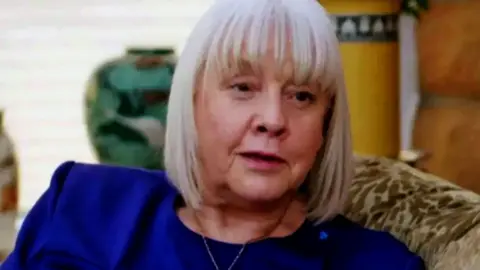Hospital Inquiry hears health boss tried to stop whistleblower
 BBC
BBCThe boss of Scotland's biggest health board tried to persuade a top doctor not to blow the whistle about patient safety concerns, a public inquiry has heard.
Dr Penelope Redding, a former clinical director at NHS Greater Glasgow and Clyde (GGC), claimed the board's chief executive Jane Grant "urged me not to do it".
Dr Redding was one of a number senior doctors who raised infection control concerns at the Queen Elizabeth University Hospital (QEUH) in Glasgow.
In a submission to the Scottish Hospitals Inquiry, Dr Redding claimed there was a "profound culture of fear and bullying" at the board which put more people off speaking out.
The inquiry is investigating the construction of the £870m QEUH campus in Glasgow, which includes the Royal Hospital for Children.
It was set up after a number of patient deaths including that of 10-year-old cancer patient Milly Main.
Dr Redding worked as an infection control doctor until 2008. She was involved in the preliminary planning for the QEUH, which opened in 2015, and was a whistleblower before she stepped down as a consultant microbiologist in 2018.
In evidence to the hearing, the retired doctor criticised "a culture of not putting things in writing, in emails, not putting things in minutes, an atmosphere of intimidation and bullying" within the NHS.
She said she only felt comfortable speaking out as she was approaching retirement.
 PA Media
PA MediaIn her statement to the inquiry, Dr Redding said: "The culture and perception within GGC at that time was that a whistleblower should be seen as a troublemaker who was to be criticised for raising concerns and causing stress to patients and relatives.
"The culture of bullying meant that people were too afraid to speak out.
"Staff were not encouraged to use the whistleblowing procedure."
The statement added that at one stage of her formal whistleblowing process Dr Redding was urged by the board's chief executive Mrs Grant not to continue with it.
She also claimed a non-executive director called her to try and persuade her not to complain that her whistleblowing allegations were not being dealt with properly.
"He repeatedly asked me 'what can we do?' to stop me doing it," she said.
In her statement, Dr Redding also said microbiology trainees produced a document detailing their concerns.
In a later meeting she heard a senior clinician respond to these by saying he was going to “destroy their careers”.
Dr Redding - who took part in a BBC Scotland documentary about the issues at the QEUH - said that the fallout from becoming a whistleblower had taken a "huge toll on my health, and on my family".
She has suffered from stress, insomnia and anxiety in the years since.
A spokesperson for NHS GGC said: "The current Scottish Hospitals Inquiry hearings have yet to hear from various key staff.
"A number of staff being mentioned during these hearings will also provide evidence and will endeavour to support the Inquiry to fully establish the facts."
The inquiry before Lord Brodie continues.
